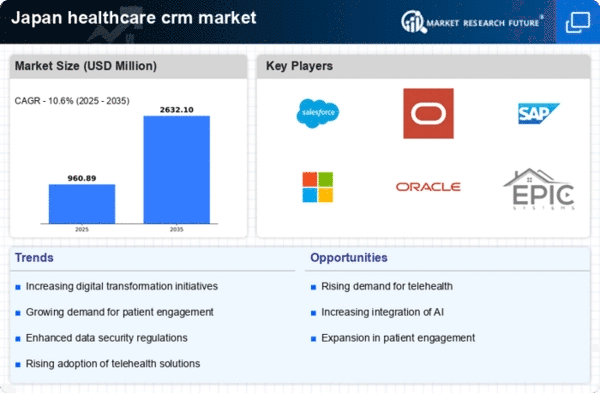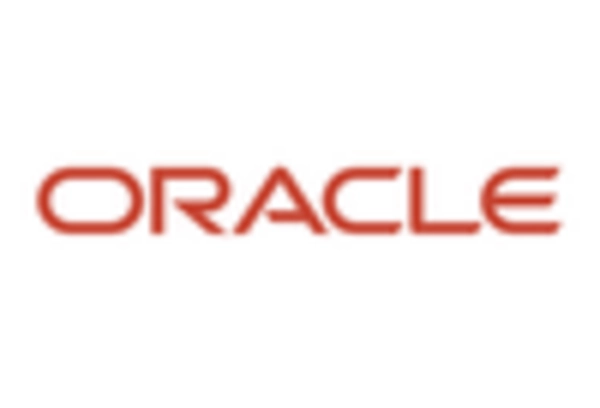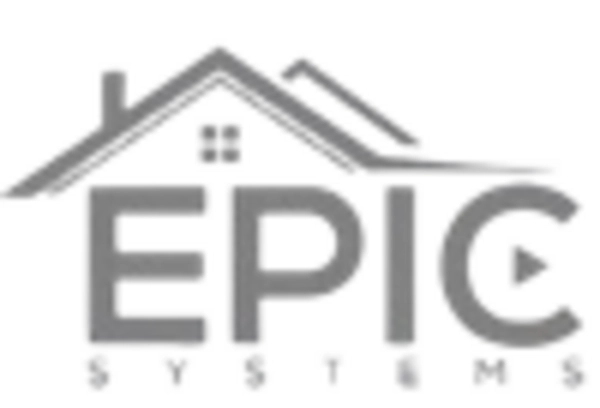Increased Focus on Data Analytics
Data analytics is becoming a cornerstone of the healthcare crm market in Japan. With the proliferation of electronic health records and patient data, healthcare organizations are recognizing the value of leveraging analytics to improve operational efficiency and patient care. By utilizing CRM systems equipped with advanced analytics capabilities, providers can gain insights into patient behavior, treatment efficacy, and resource allocation. Reports indicate that organizations employing data-driven strategies have seen a 25% improvement in patient retention rates. This emphasis on analytics is expected to drive growth in the healthcare crm market as stakeholders seek to harness data for better decision-making.
Shift Towards Value-Based Care Models
The transition to value-based care models is reshaping the healthcare crm market in Japan. This approach emphasizes patient outcomes over service volume, prompting healthcare providers to adopt CRM systems that facilitate better care coordination and patient management. By focusing on quality rather than quantity, organizations can improve patient satisfaction and reduce costs. Data suggests that healthcare providers implementing value-based care strategies have seen a 15% reduction in hospital readmission rates. This shift is likely to drive demand for healthcare crm solutions that support value-based initiatives, ultimately contributing to the market's growth.
Regulatory Changes and Compliance Needs
The evolving regulatory landscape in Japan is impacting the healthcare crm market. As new regulations regarding data privacy and patient rights are introduced, healthcare organizations must ensure compliance to avoid penalties. This necessity is driving the adoption of CRM systems that offer robust security features and compliance tracking capabilities. Organizations that prioritize regulatory adherence are likely to experience enhanced trust from patients, which can lead to increased patient loyalty. As a result, the healthcare crm market is expected to grow as providers seek solutions that not only meet regulatory requirements but also enhance overall operational efficiency.
Growing Importance of Telehealth Services
The integration of telehealth services is significantly influencing the healthcare crm market in Japan. As remote consultations become more prevalent, healthcare providers are increasingly adopting CRM systems that support telehealth functionalities. This shift not only enhances patient access to care but also streamlines communication between patients and providers. Recent statistics reveal that telehealth usage has surged by over 40% in the past year, indicating a strong demand for integrated solutions. Consequently, the healthcare crm market is likely to see a rise in demand for systems that can seamlessly incorporate telehealth features, thereby improving patient engagement and satisfaction.
Rising Demand for Personalized Healthcare
The healthcare crm market in Japan is experiencing a notable shift towards personalized healthcare solutions. As patients increasingly seek tailored treatment plans, healthcare providers are compelled to adopt CRM systems that facilitate individualized patient engagement. This trend is underscored by a growing awareness of the importance of patient satisfaction, which has been shown to enhance treatment outcomes. According to recent data, approximately 70% of patients express a preference for personalized care, prompting healthcare organizations to invest in CRM technologies that can effectively manage patient data and preferences. Consequently, the healthcare crm market is likely to expand as providers strive to meet these evolving expectations.
















